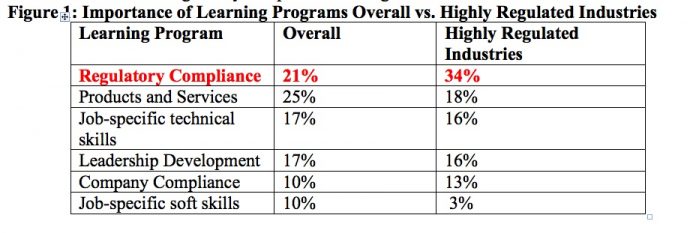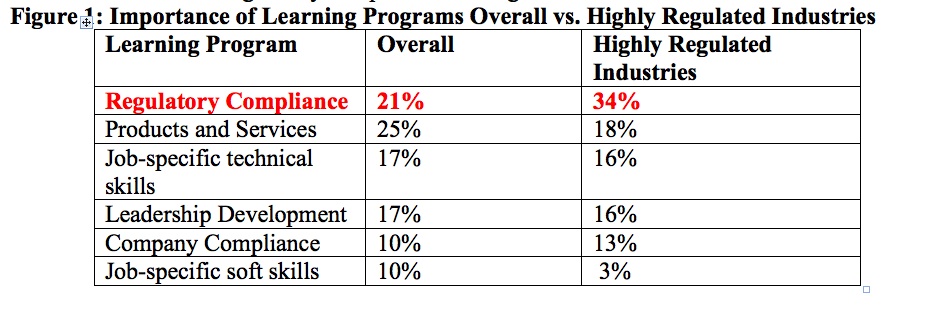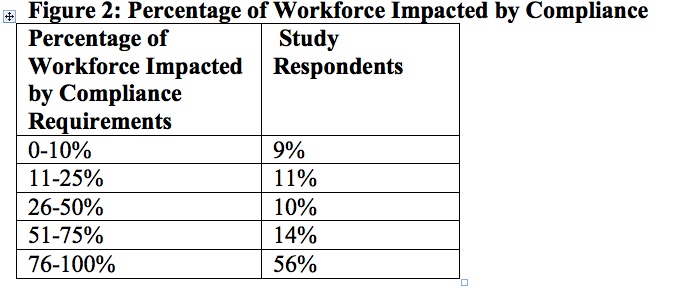
Every organization has to deal with compliance training. For some, it’s checking a box in an employee handbook. For others, it’s a matter of life and death. Brandon Hall Group’s 2014 Compliance Training Study examined just how critical compliance training has become, and why it is important for companies to begin paying more attention to how it is delivered.
Key findings:
Regulatory compliance training ranks second behind products and services training in importance to overall business strategy.
The need to demonstrate learning compliance to an external agency is considered either very or critically important to a majority of companies.
Compliance training requirements affect a large portion of the organization.
Less than half of organizations consider themselves highly prepared for a compliance audit.
Compliance Ranks High
When asked to rank various learning programs by their importance to the company’s overall business strategy, 21 percent of 207 organizations surveyed in the study ranked compliance No. 1, just behind products and services training (25 percent). Among those industries with more regulatory oversight (including finance, health care, and manufacturing), 34 percent ranked regulatory compliance No. 1. For these companies, products and services training falls to a distant second behind regulatory compliance training.

External pressures
Most of the time, it is not the organization itself that makes compliance training so important. Instead, companies are beholden to external government or association organizations to meet certain levels of compliance. The inability to meet requirements can cost the company dearly in time, money, and reputation. In our survey, only 10 percent of companies indicated it was not important they demonstrate compliance to an external agency. For our highly regulated group, that number drops to 5 percent.
Compliance Runs Deep
Compliance doesn’t typically affect just one or two groups within the organization. It often reaches far and wide, in some cases requiring every employee to reach some level of compliance. Overall, 70 percent of companies say that compliance impacts more than half of their workforce. That number is 84 percent for highly regulated companies, including 68 percent saying it impacts more than three-quarters of employees.

Are You Ready?
There is little argument against the importance of compliance, yet organizations still struggle to make it a priority. As evidence of this, we asked companies how ready for an external audit they believed themselves to be.
More highly regulated industries find themselves much better prepared, which makes sense given the level of importance the give to compliance training. However, only 12 percent say they are very highly prepared, the same as with the overall group.

Key Takeaways
Make Compliance Training Engaging
One cannot stress enough the criticality of compliance training. Being in compliance—or not—often can be the difference between being in business or not. The challenge is how to approach it. The traditional view is that it is a necessary evil that needs to be taken care of quickly. But with so much riding on compliance training, it’s time to think more strategically and develop ways to deliver more engaging, effective training.
Our research found that in-person classroom instruction is the most effective method for delivering compliance training, followed by online simulations and video. Organizations that use passive means, such as recorded PowerPoint presentations, will be disappointed with the results.

Recognize the Role of Compliance
Compliance training needs to be part of the overall learning strategy. If it is not, it will continue to be looked at as a lower priority and not get the same kind of review and development time as other types of learning. For many organizations, compliance also needs to be part of the overall business strategy.
Take Another Look
Although compliance often is driven by the prospect of fines and/or sanctions from governing bodies, the reality is that most regulations have a foundation in the safety (physical or otherwise) of either employees or customers or both. If employees are presented with compliance training in terms of what it means to them, the company, and their customers, it becomes more meaningful and engaging than when it is done simply to stay out of trouble.
David Wentworth is senior learning analyst for Brandon Hall Group, an independent firm providing human capital management research and advisory services. Practice areas include Learning and Development, Talent Management, Leadership Development, Talent Acquisition, and Human Resources/Workforce Management.




